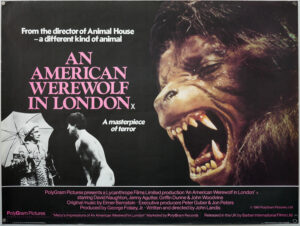The story concerns David and Jack two Americans on a backpacking trip and their encounter in the north of England with a werewolf that leaves one dead  and the other cursed with lycanthropy. There is a tragic romantic sub-plot with a nurse, Alex, played by genre favorite Jenny Agutter and a massive climatic sequence of the werewolf rampaging through central London to complete the movie.
and the other cursed with lycanthropy. There is a tragic romantic sub-plot with a nurse, Alex, played by genre favorite Jenny Agutter and a massive climatic sequence of the werewolf rampaging through central London to complete the movie.
An American Werewolf in London is a film that has left its mark on the horror genre and specifically on how people have dealt with and described werewolves and their transformations ever since. Both this movie and The Howling, released earlier in 1981, presented the first on-screen transformation that were not simply variations of the lap-dissolves used in previous werewolf films all the back to Universal’s The Wolf-Man in 1941. Both Rick Baker who did the special make-up effects in An American Werewolf in London and Rob Bottin for The Howlingprogressed to careers that pushed the boundaries of practical effects until the advent of digital visual effects.
An American Werewolf in London also presented the transformation from human to wolf as something terribly painful and motif that with its overuse has since become a cliché.
With a running time of 97 minutes the movie is by far too brief, and simultaneously feels leisurely in its developing romance and rushed in its head-long drive to get to the next supernatural sequence. This blinding speed short-cuts characters and their development for the sake of plot and exposition and contributes the film’s finale feeling abrupt. I distinctly remember sitting in the theater during its initial run feeling like the it needed to be more, that it was unfinished, as the credit’s scrolled across the screen.
